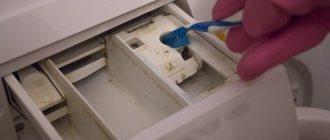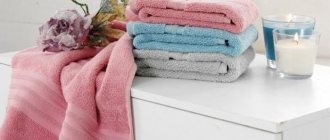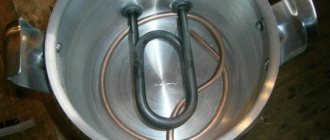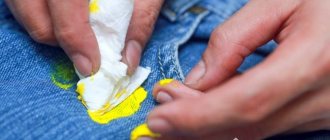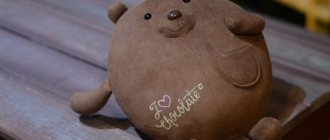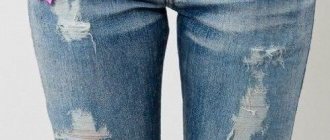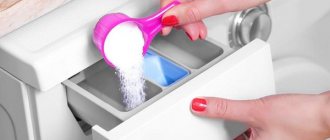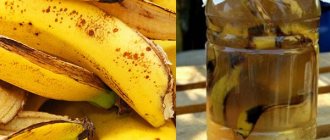Share on social media networks:
When loading laundry into the drum of a washing machine, the housewife usually wants to get perfectly clean, soft and fresh-smelling clothes. But it happens that the car disappointed expectations - the stains were washed off, but the sheets and pillowcases turned out to be so hard that sleeping on them is extremely unpleasant. To prevent this from happening, you need a fabric softener, and one that performs its functions, smells pleasant, and is not harmful to health. Such softeners will be discussed in the article.
Reasons for rigidity
When purchasing, we pay attention to the fact that the CPB is a little hard, as if starched. This is normal because the surface of the fabric is sizing - a special treatment containing starch and other substances. Processing is part of the technological finishing process, its main purpose is to protect it from dust, dirt, and also to make the PBC look presentable in the packaging. This treatment (as well as the paint particles) goes away with the first wash and the fabric becomes soft and homey.
This is in theory, but in practice this is not always the case. The hardness of bed linen depends on:
type of raw materials and fabric;
The most common types of raw materials for home textiles are:
Linen is a very dense raw material, coarser and denser than cotton or bamboo. No matter how you wash it or at what temperature, it will not become soft like cotton or bamboo, you need to understand this.
Bamboo is more hygroscopic than cotton, so water hardness directly affects its softness.
Synthetic fibers are created to make the material denser and stronger; they will not become as soft as cotton.
But with cotton everything is not so simple. Several fabrics are made from it, varying in type of manufacture, weave and density. This:
What to follow?
There are a lot of industrial fabric softeners; they are produced by almost all companies involved in the production of household chemicals. Finding a product that suits you personally is not so easy. Maybe you don't need to run to the hardware store at all, but can make some conditioner out of what you have on hand.
Important! In general, the problem of hardness in an apartment can be solved by installing an effective, but not very cheap system, the cost of which will pay off over time. Read all about mainline water filters.
Many housewives first pay attention to the aroma. This approach is not entirely correct. Of course, it’s nice when laundry smells good, but fragrance is not the most important component of a softener.
Much more important indicators are:
- compliance of the product with water hardness;
- environmental friendliness;
- health safety.
Important! How suitable a substance is for your region can only be determined experimentally. The most expensive product is not always the best.
But how environmentally friendly an air conditioner is can be determined by the labeling. Cheap fabric softeners, as well as washing powders, contain phosphates, which are harmful to health in large quantities. Especially in combination with the standard components of every household chemical product - surfactants. Synthetic flavors and various petroleum products are often used. It is better to do without them by purchasing a product with a certificate of environmental safety guarantee. This can be recognized by the Ecogarantie label.
The advantages of such substances:
- suitable for washing any clothes, including children's ones;
- do not cause allergies;
- do not cause skin diseases;
- do not cause irritation to the upper respiratory tract.
In addition, you can choose a product with either a natural scent or no scent at all if you prefer your laundry to smell only fresh.
How to wash terry towels by hand
In general, hand washing is preferable to machine washing for towels, since such material requires a careful and delicate approach.
It is believed that when washing by hand, the quality of the wash suffers, but this is a misconception. You can also wash terry towels by hand.
- Before washing directly, you need to soak the items in warm water and leave for 30-40 minutes.
- When soaking by hand, you should also discard the powder. Use liquid or laundry soap instead. The latter copes well with dirt and is gentle on the fabric.
- To further soften the towels, you can add 2 tbsp to the soap solution diluted in a basin. salt, stirring it evenly.
- Since soapy water penetrates deep into the fibers of the fabric, rinsing must be repeated at least three times in cold water.
- When washing towels by hand, it is strictly forbidden to exert a strong mechanical impact on delicate textiles. You cannot rub, beat or squeeze with tight twisting! This destroys the fibers and threads of the product. Hand movements should be light.
How to make bedding soft and fragrant
Soft bedding is the key to a comfortable sleep. After several washes, the new product becomes much softer, as the starch is washed out of it. But bedding that has become rough from time to time can be helped by either air conditioning or tennis or foil balls.
Air conditioner. The easiest way to make a product soft and fragrant is to use conditioner when washing. You can buy it at any hardware store or supermarket, however, if there are children in the family, then this option can hit your pocket hard.
Tennis or foil balls. Tennis or foil balls will help replace the air conditioner. When washing, balls help remove static on artificial fabrics and effectively fight old stains. To use this simple technology, you need to put several tennis or foil balls in the washing machine along with your bed linen. If the machine has two different sections (washing and drying), then the balls are placed in the drying section. Rolling over the laundry, they will automatically soften the material.
How to soften water in a washing machine?
When buying a new towel, any housewife dreams of maintaining its softness for a long period. However, the product loses its original appearance after each wash. There are five main reasons that lead to hard towels:
Poor quality of tap water. Unfortunately, most regions of Russia use too hard water. Calcium and magnesium salts clog fabric fibers, which negatively affects the appearance of products.- Inappropriate remedy. Particles of inexpensive dry powders get stuck in the canvas, making it rougher. The longer the pile of a towel, the more detergent remains in the fabric, which makes it stiffer.
- Wrong mode. Each product must be washed, taking into account the properties of the fabric from which it is made. Each type of fiber has its own washing mode (manual or automatic, temperature, rinse, spin).
- Errors in product care. This includes violation of the rules of drying, ironing, and storing towels.
- Low quality fabric. Unfortunately, modern industry is designed to produce inexpensive goods that quickly become unusable.
To enjoy the softness of your towels for a long time, you need to clearly identify the cause of the hardness and eliminate it. In each case, either one provoking factor or all five are possible.
To keep your towels soft for a long time, you must follow the rules of washing, drying and storing. A tag with instructions for caring for the product is attached to any product.
Typically, the information contains advice on the following processes:
- washing;
- bleaching;
- drying;
- spin;
- ironing;
- professional care.
Towels should be stored separately from other linen in a ventilated closet.
It is not recommended to put contaminated items in a common basket, as they absorb unpleasant odors from other clothes and are difficult to get rid of later.
Special products designed to effectively soften hard water in a washing machine are offered by users and specialists. Traditional methods, chemical products and special devices protect household appliances from plaque and deposits.
Users offer several options for reducing water hardness. And they all work!
Reasons for hardness of bed linen
Calico is a dense cotton fabric of plain weave, so a new product made from this material is always particularly rigid. But many continue to purchase it for their family, as it has high wear resistance and an affordable price.
Another reason for bed hardness can be hard water . In most regions of Russia, water contains large amounts of lime salts. These salts, settling on the fabric fibers, make the bed linen rougher and worsen its quality. In order to soften water, you need to use special products.
Features of the softening procedure depending on the material
The following main types of fabric are used to make towels:
- Terry. Such items should be washed and rinsed in large quantities of water. It is better to wash with liquid detergents at a temperature no higher than 600. Spin at 400–500 rpm. Ironing is not recommended. To add softness, it is possible to use all known methods.
- Cotton. Universal towels. Widely used for body and kitchen needs. The products can withstand high temperatures and spinning, but shrink and become very wrinkled. Softness is returned in all the ways described above.
- Bamboo. These towels remain soft even after 500 washes. Wash well at 300 without using bleaches or softeners. Spin at low speed is recommended.
- Velours. Washable at temperatures no higher than 400. Retains softness with gentle spinning and ironing with a warm iron. Some manufacturers do not recommend ironing products.
- Microfiber. It is of artificial origin. Products made from this fabric are soft and pleasant to the touch. They can be washed both by hand and in the machine. Do not use bleaches, softeners, or conditioners. No ironing required.
- Linen. Hard to the touch. Used as kitchen hand towels. White ones can be boiled, and colored ones can be washed at a temperature not exceeding 600. Iron with a well-heated iron.
Manufacturers may add a certain percentage of synthetic fibers to the main types of fabric, so recommendations for caring for products made from the same fabric differ.
Why did the fabric become stiff after washing?
An element that is insignificant at first glance, but adds comfort - a terry towel - affects the emotional background of the person who uses it. After a relaxing session in a hot bath or shower, you need a soft towel. Only with his help will the procedure be complete and complete.
There are several reasons why terry becomes rough, regardless of whether hand or machine washing was used:
- City water contains a lot of lime salts, which become insoluble when heated and settle on things.
- Mahra has a negative attitude towards powders. Therefore, it is better to use liquid rather than dry textile products.
- Improper washing also implies an overly aggressive mode: high water temperature, insufficient rinsing, high-speed spin.
- Soft towels should never be boiled or ironed without steaming. The fibers stick together, and the material loses its softness and fluffiness.
- Bleaching should be avoided. As a last resort, carry out the procedure before or after washing.
In order for the product to always remain soft, you need to take care of it seriously and use the right tools and auxiliary substances.
Mitigation Recommendations
There are several ways to make bedding soft. You may be able to get by with just one, or you may need the whole complex.
First of all, you need to pay attention to:
laundry detergents;
To understand that there is hard water in the house, you do not need to know its chemical composition. Suffice it to remember:
Does the soap foam well?
how often do you clean the heating elements of electrical appliances from scale;
Does the tea have an unpleasant taste when brewing?
If the soap does not have a lot of foam, the tea is not tasty, and the white deposit on the electric kettle has to be cleaned once every six months, the water needs to be made softer. To do this, special filters are installed on electrical appliances that use water, and special products containing softening granules are used for washing. But you can get by with folk remedies. In the useful tips section we will tell you how to prepare such a “softener” from ordinary vinegar.
If, in addition to the washing machine, there is a dryer in the house, it softens calico and terry just as well. Among other things, hot air lifts the lint and the sheets become more voluminous and, of course, softer.
If there is no dryer, you can hang the laundry on the balcony, but it is important not to overdry it. It’s better to remove it while it’s still a little dry and dry it with an iron.
By the way, ironing with steaming and a special spray is also an effective way to soften hard bedding.
Hypoallergenic softeners
In stores you can find several types of fabric softeners, the packaging of which will indicate that they do not cause allergies. For example, from the Attitude brand.
Such air conditioners have many attractive properties:
- any fabric becomes soft;
- the item looks fresh;
- the softener does not “eat” the color;
- ironing becomes an easy and enjoyable process;
- does not contain substances that cause allergies - fragrances, GMOs and dyes.
Important! Such products can be used not only in ordinary city high-rise buildings, but also in houses with independent sewerage. The packaging will also not harm the environment; it is classified as completely biodegradable.
Attitude softeners are made either unscented or with a subtle floral scent. These products have all international environmental safety certificates.
Eco-friendly softeners
This fabric softener is labeled “Eco” or “Bio” on the packaging. These are air conditioners from the brands Ecover, Almawin, Mio and some others.
Their advantages:
- versatility;
- suitable for any powders;
- do not contain phosphates, chlorine and surfactants.
Important! Such softeners, like hypoallergenic ones, are sold in packages that are completely recyclable. They can be used in houses with independent sewerage.
Conditioners with light floral scents are popular, and the BioMio brand has softeners with cinnamon and eucalyptus scents.
Home methods and recommendations for softening laundry
vinegar and soda in her kitchen , but few people know that these two components can not only soften hard fabric, but also remove heavy stains.
Softening fabric
with vinegar . Vinegar is a universal remedy for making fabric soft. In addition to softening the product, vinegar will help housewives remove powder residues from the product, eliminate various odors and refresh the fabric. This is especially true for mothers with small children.
